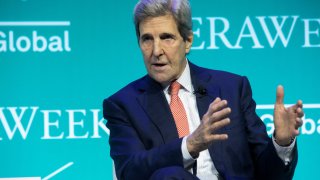
- Russia's war on Ukraine is set to be a "defining moment" for this century, said John Kerry, a former secretary of state and current U.S. climate policy chief.
- Kerry warned energy price volatility is "something we're going to live with for a little while," as countries look to put pressure on Russia.
- He also said it will be difficult for countries and businesses to hit emissions targets for 2050 if they don't start to make changes in the near term.
Volatile energy prices are here to stay with Russia's war on Ukraine set to be a "defining moment" for this century, John Kerry, special presidential envoy for climate, said Monday at CERAWeek by S&P Global.
WATCH ANYTIME FOR FREE
Stream NBC10 Boston news for free, 24/7, wherever you are. |
His comments come as the Russian invasion has upended global energy markets and supply chains. Oil shot above $130 Sunday evening for the first time since 2008 and natural gas in Europe is trading at levels that have never been seen before.
Kerry, who served as secretary of state during the Obama administration, said volatility is "something we're going to live with for a little while," with nations around the world having to come together to counter President Vladimir Putin's "illegal, unprovoked, profoundly dangerous" war.
Get updates on what's happening in Boston to your inbox. Sign up for our News Headlines newsletter.
"People realize this is a serious moment for all of us in the world. And it's also serious, needless to say," in regards to "what's happening to our planet," Kerry said.
In terms of the energy transition, companies and nations are not doing enough in the here and now, he said.
Many emissions-reduction targets focus on 2050, but an emphasis on goals three decades away is misguided, Kerry said. The current decade is the critical one — only action now will achieve 2050's stated goals, he said.
Money Report
"You can't get there … if you don't do what you need to do between 2020 and 2030," he said.
Kerry added that the Biden administration is committed to an "all of the above" approach when it comes to future energy policy.






